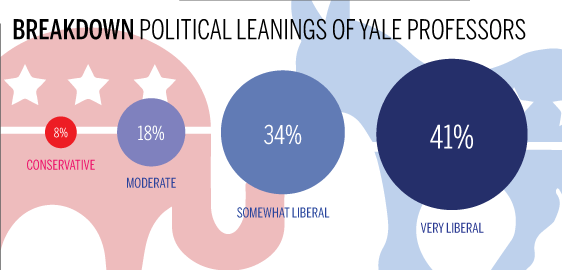Yale faculty skews liberal, survey shows
Nearly 75 percent of faculty respondents described themselves as “liberal” or “very liberal,” with only 7 percent reporting conservative leanings. Just 2 percent of respondents said they are “very conservative.”

Sometimes criticized as an Ivy League echo chamber, Yale is home to three times as many politically liberal faculty members as conservatives and centrists, according to a recent News survey.
Nearly 75 percent of faculty respondents described themselves as “liberal” or “very liberal,” with only 7 percent reporting conservative leanings. Just 2 percent of respondents said they are “very conservative.” And nearly the entire faculty expressed opposition to the administration of President Donald Trump.
The News distributed the survey in late August to members of the Faculty of Arts and Sciences’ 53 programs and departments, with a response rate of 36 percent, or 314 faculty members. This story is the second in a three-part series examining faculty perspectives on a range of issues, from politics to academics to university administration. Survey results were not adjusted for bias.
“We talk about diversity in every area of the University except the one that counts, and that’s intellectual diversity,” said Steven Smith, a political science professor. “Universities are basically and fundamentally devoted to the study and investigation of ideas. The expression of the full range of ideas is the central aspect of a university’s mission.”
University President Peter Salovey said last year that the lack of racial diversity on Yale’s largely white faculty is the “single biggest problem” facing the University. In 2015, Yale pledged to spend $50 million over five years to hire more faculty from historically underrepresented groups.
Asked this week whether he was also concerned that three quarters of the faculty are politically liberal, Salovey said he views the survey results as “neither a positive nor a negative.”
“It‘s in the educational interest of students to be exposed to a diversity of political viewpoints,” Salovey said. “Having said that, in most fields, the political point of view of a faculty member is not relevant to the substance of their teaching, and so we would need to be very careful about making it a part of the hiring process for faculty.”
In an email to the News, computer science professor David Gelernter ’76, who emerged earlier this year as a candidate for science advisor in the Trump White House, said he was surprised that the survey did not reveal an even greater liberal skew. A more politically diverse faculty would be ideal, Gelernter said, because the ideological leanings of professors have a direct impact on students.
“Students who leave the academic world run a chance, at least, of discovering new approaches to the world and turning conservative,” he said. “But those who stay within academia tend to keep thinking what they’ve been taught to think.”
The political skew is particularly pronounced in the humanities, where nearly 90 percent of faculty respondents described themselves as “very liberal” or “somewhat liberal.” By contrast, just 68 percent of social sciences faculty and 65 percent of STEM faculty said they were liberal.
Faculty hiring at Yale is largely conducted at the departmental level, which could make it difficult for the administration to conduct any large-scale effort to foster intellectual diversity. But individual professors can still take steps to promote diverse viewpoints through course curricula, said Joseph Zolner, an expert on higher education at Harvard’s Graduate School of Education.
“One could be an avowed liberal, but he or she could structure his or her course in a way that is ensuring that students are being exposed to more than just one point of view in a class,” Zolner said.
Whether liberal or conservative, Yale professors are largely united in opposition to Trump, according to the survey. Ninety percent of respondents said they oppose the current administration, including the majority of conservative respondents.
More than 90 percent of faculty said climate change is caused by human activity, and 70 percent agreed that New Haven should remain a sanctuary city. But the faculty was split almost 50–50 on whether trigger warnings are necessary to campus discussion.
Yale is hardly the only elite university with a liberal faculty. A nationwide study published last year in the electronic journal Econ Journal Watch found that Democratic professors outnumber Republicans by a ratio of 12 to 1.
“We’ve been going along this way for a long time really, decades, and I don’t see a likelihood that it’s going to change,” said Charles Hill, an international studies lecturer who worked as an advisor to former President Ronald Reagan. “There are various sectors in American life and … certain sectors are going to lean more one way than another along a political spectrum.”
Still, it is important for university faculty to expose themselves to different points of view, Gelernter said. While many conservatives regularly peruse the New York Times, he said, relatively few liberal professors read news coverage from centrist or right-wing outlets.
“That’s the real problem,” Gelernter said. “Not the monolithic opinions of the faculty, but the ignorance on which it rests. Of course I don’t mean every liberal — some are brilliant, obviously. But … generally speaking, it’s a grim picture.”
Britton O’Daly contributed reporting.
Rachel Treisman | rachel.treisman@yale.edu | @rachel_treisman
David Yaffe-Bellany | david.yaffe-bellany@yale.edu | @yaffebellany







